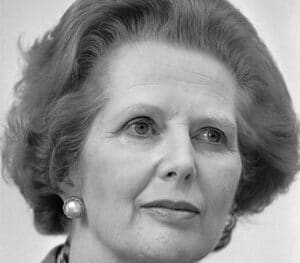
Margaret Thatcher (1925–2013)
Margaret Thatcher grew up living in a small flat above her father’s grocery store and rose to become the first female prime minister of Great Britain. After several unsuccessful attempts to enter politics, she was elected to the House of Commons in 1959 and eventually became the leader of the Conservative Party, the first woman opposition leader in the House of Commons. England’s political and economic turmoil, high unemployment and nearly bankrupt treasury led to a Conservative Party victory in 1979. As prime minister, Thatcher implemented economic policies promoting deregulation, flexible labour markets and the privatisation of state-owned companies.
As a result of her strong anti-communist stance, she was dubbed ‘The Iron Lady’ by a Soviet military newspaper. Along with Ronald Reagan, she believed in a firm and united front against communism, helping to end of the Cold War between East and West.
In a speech the Conservative Party Conference in 1975, she said:
‘Some socialists seem to believe that people should be numbers in a state computer. We believe they should be individuals. We are all unequal. No one, thank heavens, is like anyone else, however much the socialists may pretend otherwise. We believe that everyone has the right to be unequal, but to us every human being is equally important.’
